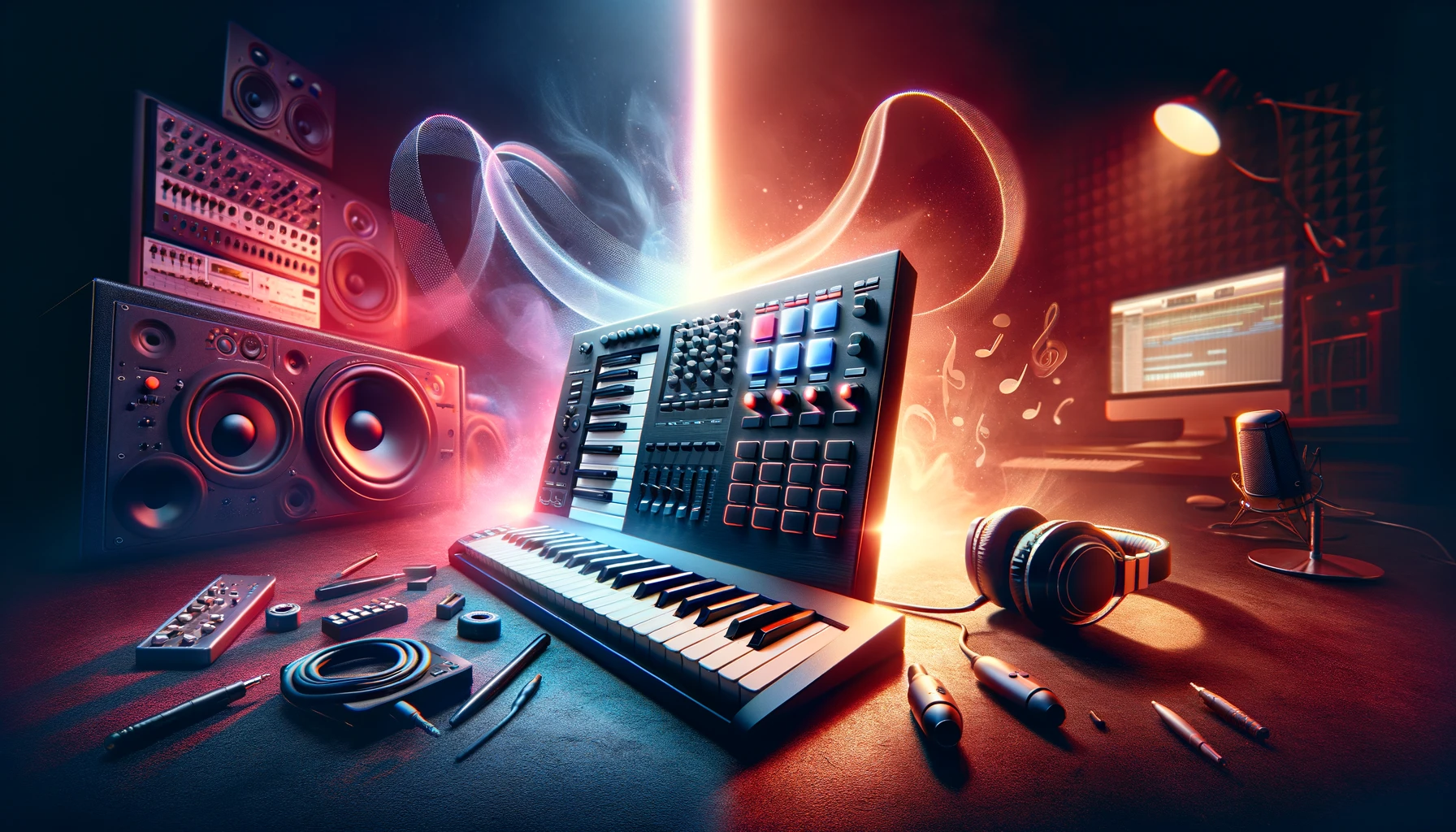Are you a musician or producer struggling to decide between a MIDI controller and a keyboard?
Choosing the right instrument can make a significant difference in your workflow, creativity, and overall musical experience.
In this comprehensive guide, we’ll explore the key differences between MIDI controllers and keyboards, helping you assess your needs and make an informed decision.
Let’s dive in!
Should I buy a MIDI controller or a keyboard for DJing?

For DJs, a MIDI controller is often the better choice due to its compact size, portability, and versatile control options.
MIDI controllers allow you to manipulate various parameters of your DJ software and effects in real-time, enhancing your performance capabilities.
However, if you plan to incorporate live instrumentation or performances into your DJ sets, a keyboard could also be a valuable addition to your setup.
We will explore the pros and cons of each option in more depth below.
Understanding the Differences

Choosing between a MIDI controller and a keyboard can be a daunting task, especially if you’re new to music production or performance.
To make an informed decision, it’s essential to understand the fundamental differences between these two instruments.
Size and Portability
MIDI controllers are typically more compact and lightweight compared to keyboards, making them easier to transport and set up.
Keyboards, on the other hand, tend to be larger and heavier, often requiring more space and effort to move around.
Number of Keys
MIDI controllers usually have a smaller number of keys, ranging from 25 to 61, while keyboards often feature a full-sized 88-key layout.
This means that MIDI controllers may be more suitable for playing basslines, chords, and melodies, while keyboards offer a wider range for playing more complex piano pieces.
Functionality
MIDI controllers are designed primarily to control music software and digital instruments, providing a wide range of controls such as knobs, sliders, and pads.
Keyboards, however, are typically self-contained instruments with built-in sounds and speakers, allowing you to play and perform without the need for a computer or external gear.
Assessing Your Needs

Before deciding between a MIDI controller and a keyboard, it’s crucial to assess your specific needs and preferences.
Consider the following factors:
Portability and Mobility
If you frequently travel or perform in different venues, a lightweight and compact MIDI controller may be a better choice.
However, if you primarily work in a home studio or have a dedicated space for your setup, a larger keyboard may not be an issue.
Versatility and Control
MIDI controllers offer greater versatility and control over virtual instruments and effects, making them a popular choice for music producers and composers.
If you’re primarily interested in composing, recording, and manipulating sounds, a MIDI controller might be the way to go.
Playing Style and Comfort
For musicians who prefer a traditional piano-like feel and layout, a keyboard may be more comfortable and familiar.
However, if you’re used to playing synthesizers or drum pads, a MIDI controller with a customizable layout may better suit your playing style.
Budget Considerations
MIDI controllers and keyboards vary widely in price, so it’s essential to consider your budget when making a decision.
Entry-level MIDI controllers can be relatively affordable, while high-end keyboards can be significantly more expensive.
MIDI Controllers: The Versatile Choice

MIDI controllers offer a range of benefits that make them a popular choice among music producers, composers, and performers.
Compact and Portable
One of the primary advantages of MIDI controllers is their compact size and portability.
Many models can easily fit into a backpack or carrying case, making them ideal for musicians who need to move their setup frequently.
Versatile Control
MIDI controllers provide a wide range of controls, including knobs, sliders, pads, and buttons, allowing you to manipulate various parameters of virtual instruments and effects.
This level of control can be particularly useful for creating unique and dynamic sounds, as well as for live performance.
Integration with DAWs and Plugins
MIDI controllers are designed to seamlessly integrate with digital audio workstations (DAWs) and software instruments, providing a hands-on approach to music production and performance.
This integration allows you to control parameters such as volume, panning, and effects in real-time, enhancing your creative workflow.
Customizable Layouts
Many MIDI controllers offer customizable layouts, allowing you to assign specific functions to different controls.
This level of customization can help streamline your workflow and make the most of your controller’s capabilities.
Keyboards: The Traditional Approach
Keyboards have been a staple in music production and performance for decades, offering a familiar and intuitive playing experience.
Built-in Sounds and Speaker
One of the primary advantages of keyboards is their built-in sounds and speakers, allowing you to play and perform without the need for a computer or external gear.
This can be particularly useful for live performances, where setup time and space may be limited.
Familiar Piano-like Feel
Keyboards often feature a full-sized 88-key layout, providing a familiar piano-like feel that can be comfortable for musicians who are used to playing traditional instruments.
This can be especially beneficial for those who are transitioning from acoustic piano to digital piano or keyboard.
Recording and Playback
Many keyboards offer built-in recording and playback capabilities, allowing you to record your performances and compositions directly onto the instrument.
This can be a useful feature for songwriters and composers who want to capture their ideas quickly without the need for additional equipment.
Integration with Your Setup
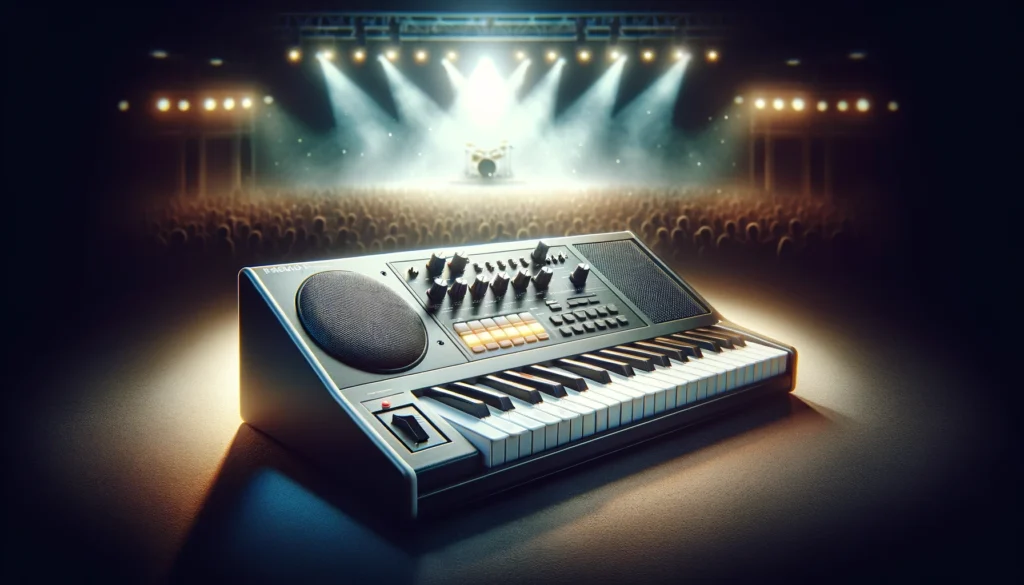
Both MIDI controllers and keyboards can be integrated into existing music setups, but the specifics of this integration will depend on your individual needs and preferences.
Integration with Computers and DAWs
MIDI controllers are designed to work seamlessly with computers and digital audio workstations (DAWs), making them a popular choice for producers and composers who rely heavily on software-based music production.
Keyboards, on the other hand, can also be integrated with computers and DAWs, but may require additional hardware and software to achieve the same level of control and integration as MIDI controllers.
Integration with Other Instruments and Gear
If you already have a collection of virtual instruments, effects, and other gear, a MIDI controller can be an effective way to control and manipulate these elements in real-time.
Keyboards, while useful for playing and performing, may not offer the same level of control and integration with other gear.
Budget Considerations
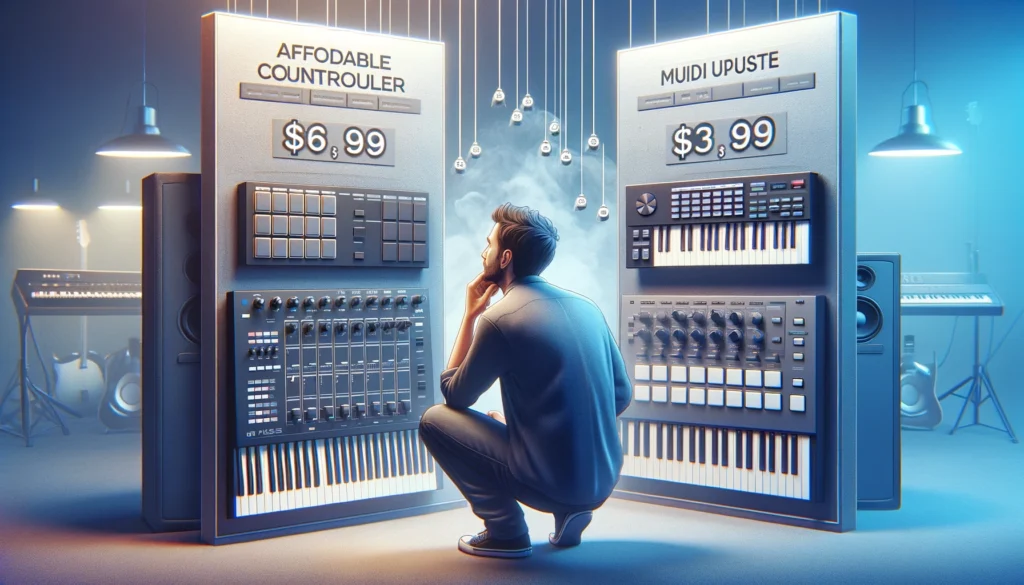
The cost of MIDI controllers and keyboards can vary widely, depending on the features, brand, and quality of the instrument.
MIDI Controller Price Range
Entry-level MIDI controllers can be relatively affordable, with basic models starting around $50 to $100.
More advanced controllers with additional features and controls can range from $200 to $500, while high-end professional models can cost upwards of $1,000 or more.
Keyboard Price Range
Keyboards also have a wide range of prices, with entry-level models starting around $100 to $300.
Mid-range keyboards with more features and sounds can cost anywhere from $300 to $1,000, while high-end digital pianos and workstations can easily exceed $2,000 or more.
Determining Your Budget
When determining your budget for a MIDI controller or keyboard, it’s important to consider your specific needs and intended use.
If you’re just starting out or have limited resources, an entry-level MIDI controller or keyboard may be a more practical choice.
However, if you’re a professional musician or producer, investing in a higher-quality instrument with more features and controls may be worth the additional cost.
Expert Opinions and Recommendations
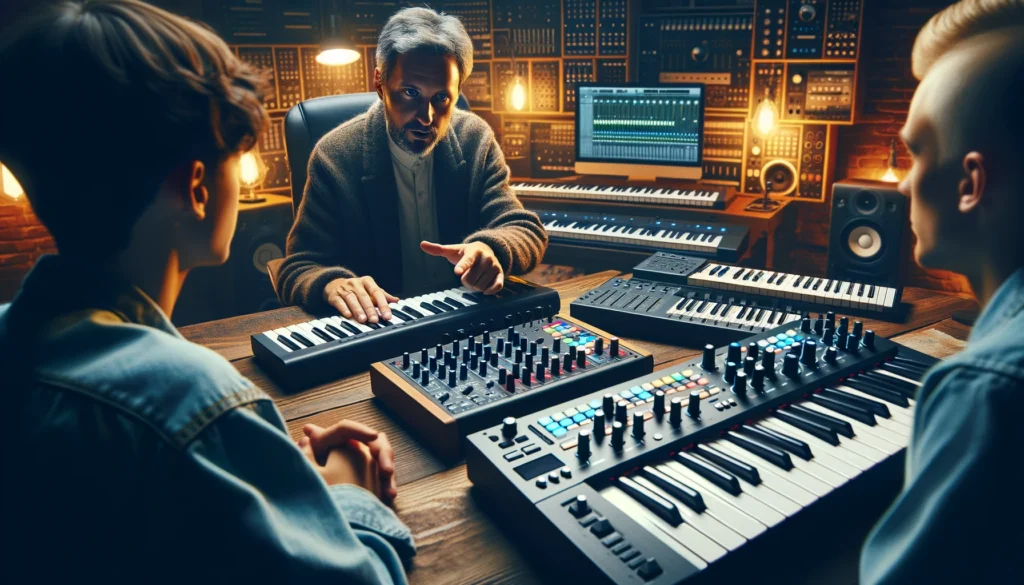
To help you make an informed decision, it can be useful to seek out expert opinions and recommendations from professional musicians and producers.
MIDI Controller Recommendations
Many producers and composers prefer MIDI controllers for their versatility and control over virtual instruments and effects.
Experts often recommend controllers with a good balance of knobs, sliders, and pads, as well as customizable layouts and integration with popular DAWs.
Keyboard Recommendations
For musicians who prioritize a traditional piano-like feel and playing experience, keyboards are often the recommended choice.
Experts suggest looking for keyboards with weighted keys, built-in sounds, and recording capabilities for a more authentic and immersive playing experience.
Considering Your Specific Needs
Ultimately, the decision between a MIDI controller and a keyboard will depend on your specific needs and preferences.
It’s important to consider factors such as portability, versatility, playing style, and budget when making your choice.
Hands-on Experience
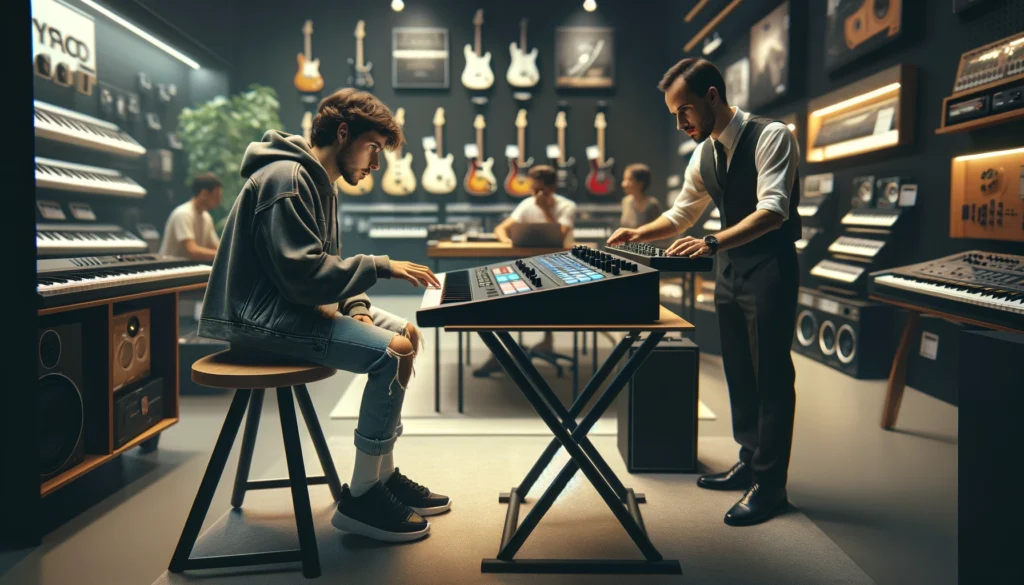
To truly understand the differences between MIDI controllers and keyboards, it’s highly recommended to visit music stores and test out different models in person.
Testing MIDI Controllers
When testing MIDI controllers, pay attention to the layout and feel of the controls, as well as the integration with your preferred software and virtual instruments.
Try out different configurations and setups to see what feels most comfortable and intuitive for your workflow.
Trying Out Keyboards
When evaluating keyboards, focus on the feel of the keys and the quality of the built-in sounds.
Play a variety of styles and genres to get a sense of the keyboard’s versatility and suitability for your specific musical needs.
Getting Hands-on Experience
By getting hands-on experience with both MIDI controllers and keyboards, you’ll be able to make a more informed decision based on your personal preferences and playing style.
Don’t be afraid to ask questions and seek guidance from knowledgeable sales staff, who can provide valuable insights and recommendations based on your unique requirements.
Conclusion
The decision between a MIDI controller and a keyboard ultimately comes down to your specific needs, preferences, and budget.
MIDI controllers offer versatility, control, and portability, while keyboards provide a familiar piano-like feel and built-in sounds.
By understanding the differences, assessing your needs, and getting hands-on experience, you’ll be able to make the best decision for your music production and performance goals.
